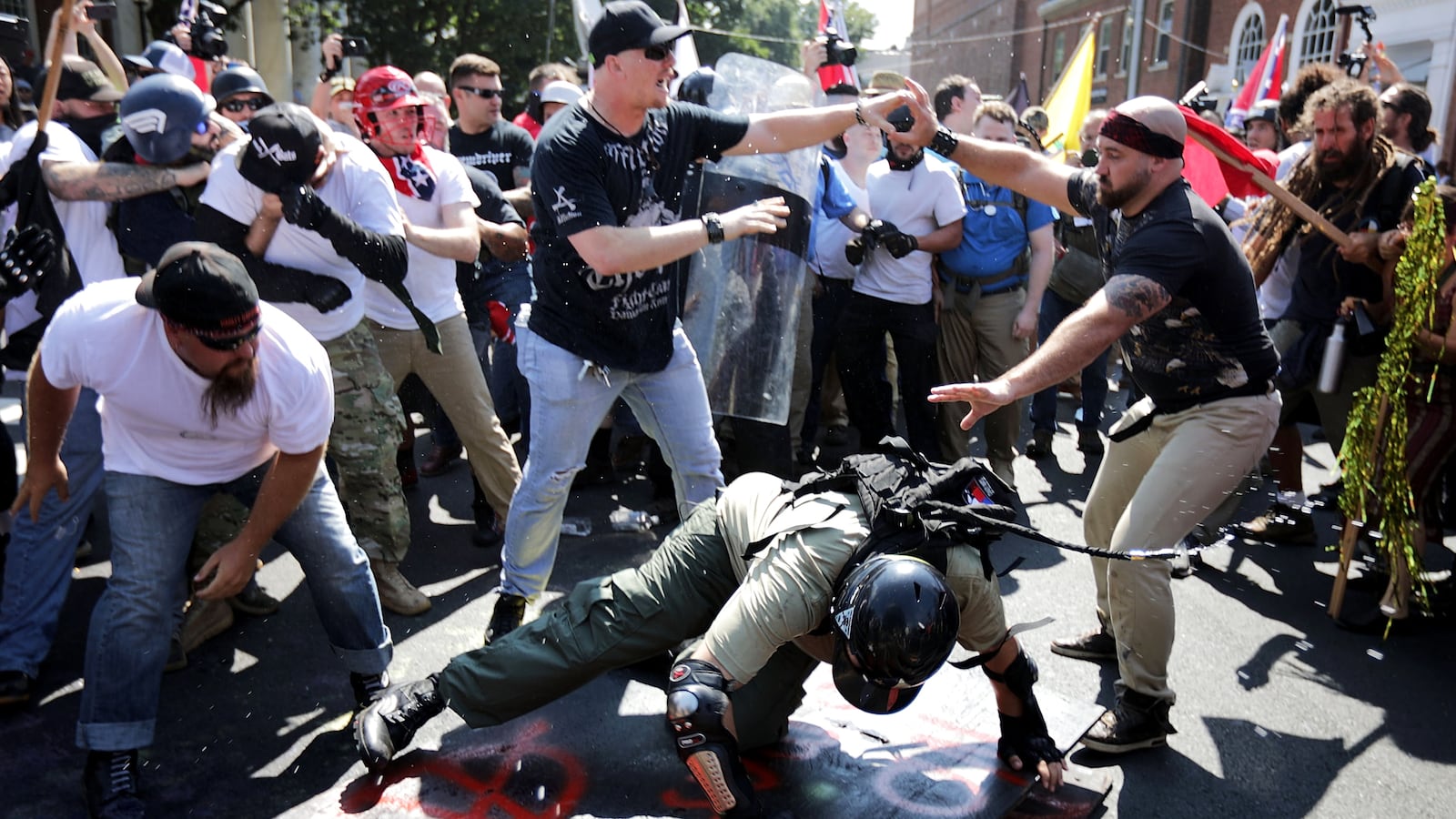A coalition of 18 activist groups said Thursday they will oppose the next Unite the Right rally in Washington, D.C. in August.
The first Unite the Right rally, a summit for white supremacists in Charlottesville, Virginia last August, turned deadly after a man associated with a neo-Nazi group drove a car into a crowd of anti-racist protesters, killing one. Unite the Right’s organizer, Jason Kessler, has received tentative approval to host a sequel event in D.C. this summer. Now the “DC Against Hate” coalition, which includes racial justice, anti-fascist, and feminist organizations, announced plans to counter Unite the Right in a three-day demonstration.
The counter-protest could see activists stand off against far-right demonstrators, as well as D.C. police, who have previously cracked down on anti-fascist demonstrations in the city.
“It’s fairly early in the process, but we are calling for as many people in D.C. and nationally to come to this as possible,” activist Dylan Petrohilos told The Daily Beast. Petrohilos is a member of ResistThis, one of the anti-fascist groups participating in DC Against Hate. “We’re hoping to get people from all walks of life.”
DC Against Hate is also scheduling events like teach-ins to run alongside protests, he said. Some participants are from social justice groups in Charlottesville, which have spent the last year dealing with the first rally’s fallout. Their counter-protest this year is scheduled from August 10, the day before Unite the Right, until Unite the Right ends on August 12.
Organizers previously told the Forward they expected more than 1,000 people to attend the DC Against Hate demonstrations. In his permit application for the D.C. rally, Kessler said he anticipates approximately 400 Unite the Right attendees, although the actual figures remain fuzzy: Members of the far-right have distanced themselves from Kessler en masse, due in part to pressure from activists. Leaked chat records from last month reveal that Kessler is coordinating with members of the neo-Nazi group Vanguard America, who, in turn, have promised to bring members of the violent skinhead group the Hammerskins.
Kessler isn’t welcome in D.C., DC Against Hate wrote in a message signed by all 18 participating groups.
“Jason Kessler will find no rest, no refuge, no respite,” the coalition wrote. “Communities in DC will unite against hate, borders, prison, and the vision of Unite the Right.”
But anti-fascist activists and D.C. police have a troubled history.
More than 200 people including demonstrators, journalists, and observers, were arrested during Disrupt J20, an anti-fascist march outside President Donald Trump’s inauguration in D.C. on January 20, 2017. Arrestees (many of whom were never charged) accused police of brutality and sexual abuse. Approximately 200 people were later charged on riot counts, sometimes on flimsy evidence including allegations that they had worn black, shouted anti-capitalist chants, or had been near people who damaged property.
Petrohilos was arrested for his alleged role in organizing Disrupt J20, although he says he was not actually present at the march. Police later arrested him in a raid on his home. (He had allegedly appeared on a podcast promoting Disrupt J20.)
Leftist activists who attended the first Unite the Right rally have accused multiple law enforcement agencies of failing to intervene against the far-right.
“Antifa and [D.C. Metropolitan Police] are quite aware of each other,” Petrohilos said. “I think, if there’s any interactions between antifa, MPD, and Jason Kessler, it’s probably going to be like all over the country where police are making communities less safe by protecting fascists who are advocating for ethnic cleansing and genocide.”
D.C.’s riot laws are particularly troubling for activists like Petrohilos. The district’s riot statute was seldom used before January 20, 2017. One of those cases, the arrest of a man accused of rioting in the aftermath of Martin Luther King Jr.’s murder, established a worrying precedent for future arrests, Sam Adler-Bell previously wrote in Mask Magazine. The court ruled that black activists’ protests in the wake of King’s murder did not constitute legitimate political action as protected by the First Amendment, but were instead “mindless, insensate violence and destruction unredeemed by any social value and serving no legitimate need for political expression.”
The ruling meant that future demonstrations, like that outside Trump’s inauguration, could be written off as a destructive “riot,” rather than a protected “protest,” so long as the demonstration contains five or more people, any of whom engage in “tumultuous and violent conduct or the threat thereof creates grave danger of damage or injury to property or persons.” Activist groups like the Gay and Lesbian Activists Alliance have unsuccessfully demanded the statute’s revision, calling it overbroad.
For a subset of activists, DC Against Hate means hosting a new anti-fascist demonstration in D.C., just weeks or months after prosecutors dropped charges from their previous anti-fascist demonstration in D.C. For another group of activists, particularly those from Charlottesville, the event means facing down the same groups who terrorized their city last August.
“I’m personally ready for this, but this is a very scary time,” Petrohilos said. “I have legal consequences from, and was accused of organizing a protest against fascism. For me, going back into this is a risk, but it’s a calculated one.
“We need people to actually show up against fascism, and we need community members to understand that this is a serious threat and a growing one in our community.”






